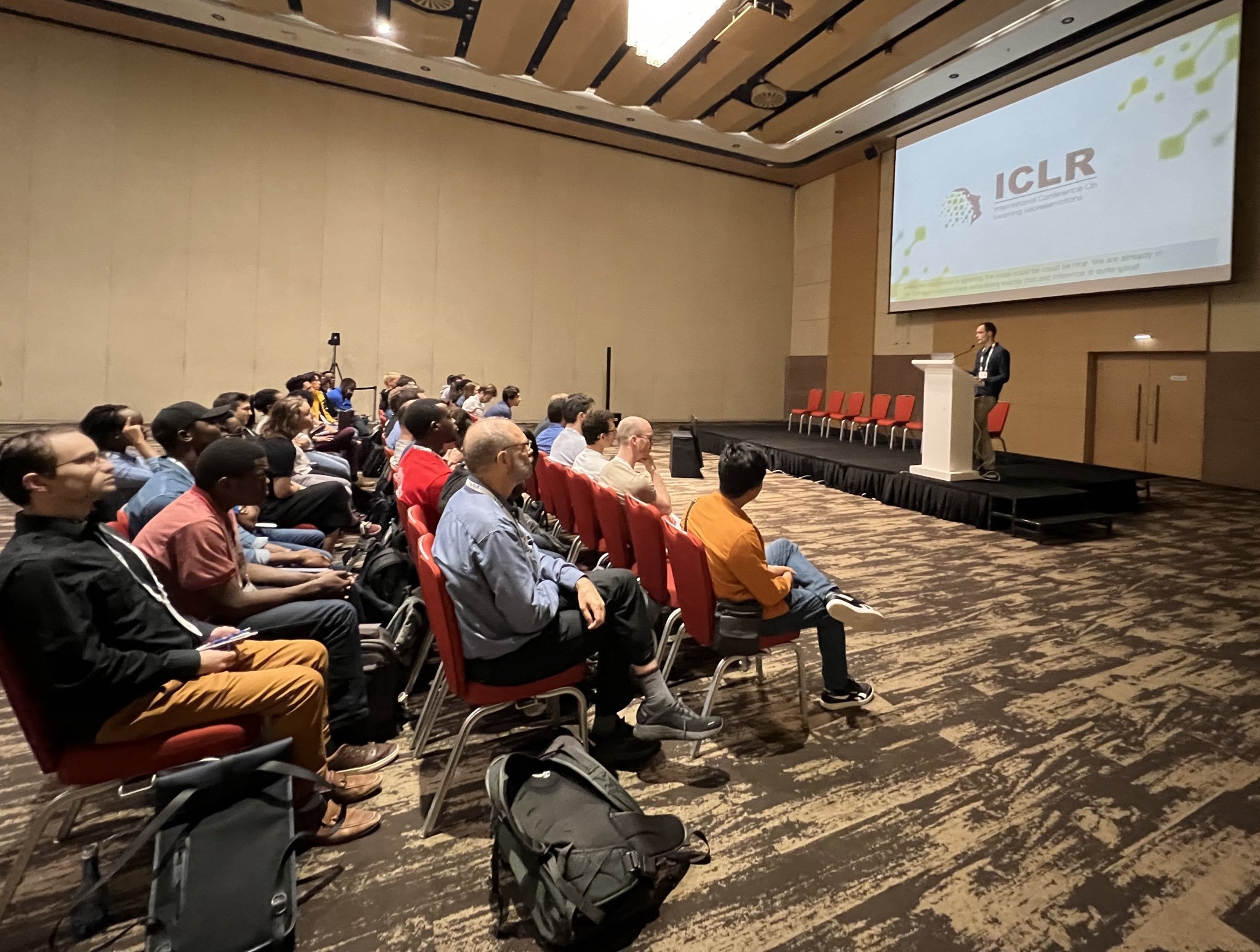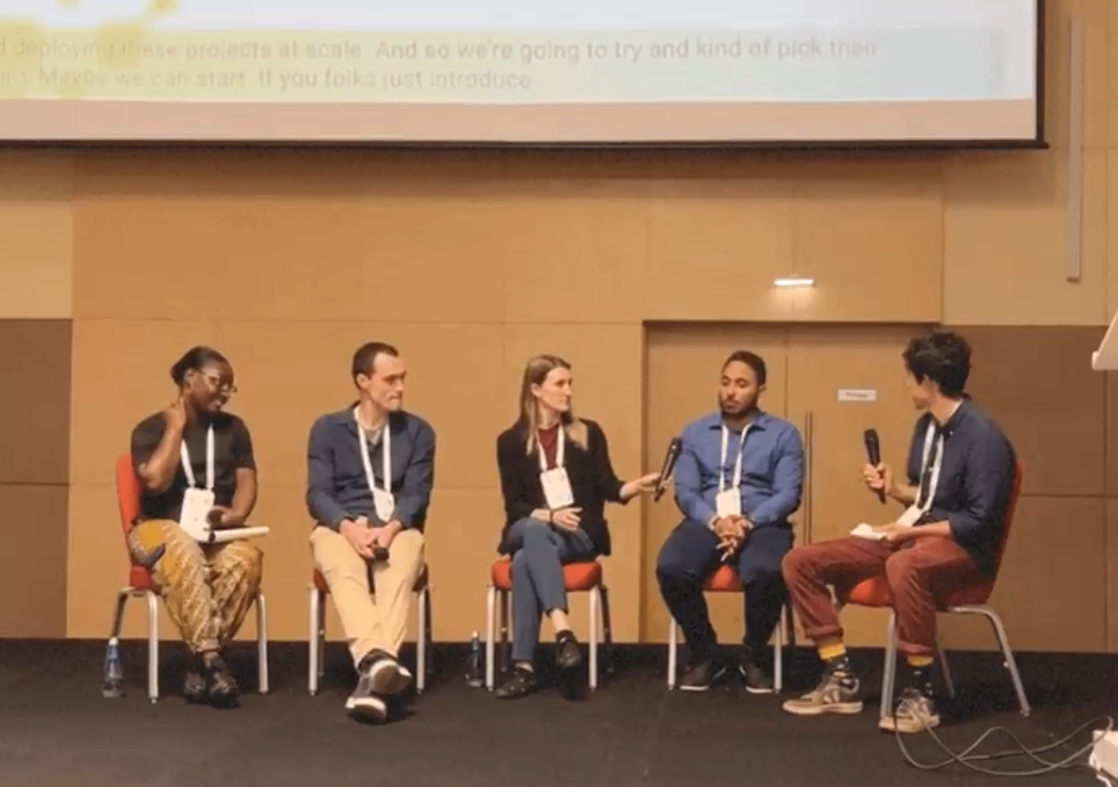NASA Harvest Hosts AI for Remote Sensing Workshop in Rwanda
NASA Harvest hosted a “Machine Learning for Remote Sensing” workshop for attendees of the ICLR 2023 conference in Kigali, Rwanda. The International Conference on Learning Representations’ (ICLR) 2023 brought together experts to explore and discuss developments in the field of machine learning. The workshop was organized by NASA Harvest’s AI Lead, Hannah Kerner; Africa Program Lead, Catherine Nakalembe; and Machine Learning engineers Ivan Zvonkov and Gabriel Tseng, alongside partners from the Rwanda Space Agency, Carnegie Mellon University Africa, Clark University, and the German Aerospace Center. The workshop was sponsored by Microsoft, CMU Africa, IEEE Geoscience and Remote Sensing Society, and Astraea. Attendees were treated to a full day of activities including 3 keynotes, 2 panel discussions, and numerous oral and poster presentations on recent developments in the field of machine learning for remote sensing.
Ange Tesire, Gabriel Tseng, Hannah Kerner, Ivan Zvonkov, Gedeon Muhawenayo, and Moise Busogi; organizers of the Machine Learning for Remote Sensing Workshop at ICLR 2023.
The ICLR conference is an annual gathering of AI professionals focused on all areas of machine learning. Its 2023 gathering in Kigali, Rwanda provided the perfect opportunity for the workshop to highlight how researchers are integrating AI for Earth observations (AI4EO) into agriculture and other applications around the world, but particularly across Africa.
The Africa Initiative within NASA Harvest has a deep portfolio of projects ranging from novel data collection methodologies and high-resolution smallholder cropland mapping to the creation of national crop monitor reports and capacity building. The NASA Harvest Africa Initiative has also recently developed new partnerships with the Rwanda Space Agency and Carnegie Mellon University Africa.
Kristof Van Tricht of VITO gives a keynote address on the process and takeaways of developing global crop maps in the ambitious World Cereals project.
The workshop had a jam packed agenda, including keynote addresses with speakers from Microsoft, Google, Uganda’s first AI lab Makerere AI, and remote sensing firm VITO. Workshop participants also got to attend two panel discussions on the challenges and opportunities of ML and remote sensing in Africa and how to bridge the gap between research and deployment. Workshop conveners solicited research papers and hosted oral presentations and a poster session highlighting recent advancements in AI4EO. Links to the accepted papers can be found on the workshop’s webpage.
Additionally, several of the workshop organizers hosted a machine learning for remote sensing tutorial the day prior to the workshop at Carnegie Mellon University (CMU) Africa’s Kigali campus. During the tutorial, more than 40 participants were introduced to remote sensing data and machine learning fundamentals and techniques, followed by real world case studies in agriculture, land cover, and marine applications. CMU Africa also sponsored one-day ICLR registrations for all tutorial participants to attend the Machine Learning for Remote Sensing workshop and other conference activities. Slides from the tutorial and resources to further develop ML for remote sensing skills are available to the public on the tutorial's webpage.
“This workshop was a wonderful opportunity to bring experts in machine learning and remote sensing from around the world together to discuss not only the newest developments in our field, but also where we are going. Getting perspectives from people at research institutions, private industry, government agencies, and those with experience in operational uptake is vital in making sure that our work continues to create a positive impact for global communities,” said Kerner.
Abigail Annkah of Google gives a keynote presentation on how her team is mapping the built environment of Africa and beyond.
A workshop panel discusses the challenges of bridging the gap between research and deployment. From left to right: Abigail Annkah (Google), Kristof Van Tricht (VITO), Esther Rolf (Harvard University), Anthony Ortiz (Microsoft), and Gabriel Tseng (NASA Harvest/McGill University).




